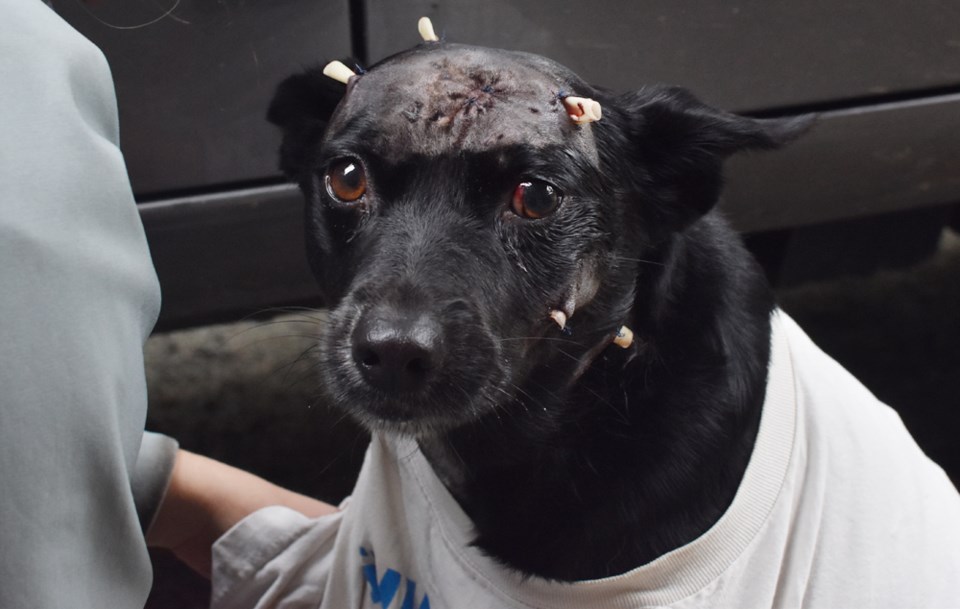Despite nicks to her jugular and a fractured skull, the prognosis is good for an 18-kilogram dog that was mauled by a cougar in Langdale on Oct. 4.
“I heard a couple of barks as though she’d seen it and was responding,” followed by “two yowls of pain” and then a “ginormous yowl of pain,” said Alicia Lavalle, who owns Loba, a four-year-old border collie mix.
Lavalle ran across her property, rounded the corner and saw Loba “in the cougar’s jaw,” before the cat dragged the dog into the woods. “That’s the last I saw of the cougar,” she said. Lavalle yelled, threw rocks and used a bear banger to scare off the animal and eventually found Loba tucked away in some brush in the woods. Lavalle estimates the dog was dragged 50 metres.
Loba is now back home after three hours of emergency surgery at Gibsons Veterinary Hospital over the weekend, though she hasn’t cleared dangers of infection and may lose eyesight and smell in one sinus.
Herschel Frimer, the veterinarian who performed the surgery, “lost count” of how many stitches he gave the dog, said Lavalle. Loba has 13 deep puncture wounds, three fractures to her eye orbital bone, and “an untold number of other scratches and bites.” Pieces of her fractured skull had to be removed during surgery.
Loba was one of three dogs injured last week in separate cougar attacks.
“We’re so lucky the dogs have survived,” said Sgt. Dean Miller of the Conservation Officer Service, adding that is was “incredibly surprising” that Loba is alive.
The other two attacks occurred in Pender Harbour on Sept. 29 and on Oct. 2 in Roberts Creek, where the dog suffered from “quite a large slash” and puncture wounds from the cougar’s canines.
All three incidents were “textbook” cases of off-leash dogs encountering the animals and not realizing “that cougars are quite different,” said Miller.
There are no seasonal explanations for the unusual string of attacks, since snow has yet to accumulate in high elevation areas. The cougars did not display predatory behaviour, either, but instead were acting defensively, said Miller, who encourages people to practise vigilance and keep their dogs leashed whenever possible.
Aside from cougars, Miller said officers have been responding to a “considerable number” of bears being hit by cars, including a cub that was found dead on the side of the road near Kinnikinnick Park a few weeks ago, which belonged to a bear known in the area to be suffering from a debilitating back injury. Conservation officers are monitoring the status of the injured bear’s health and said her other cub appears healthy.
As denning season approaches and with other food sources such as blackberries drying up, people should keep all attractants such as fruit, garbage and birdseed cleaned up and out of reach. Bears are currently experiencing “hyperphagia,” a phase requiring them to forage for up to 20 hours and consume up to 20,000 calories a day.
There have been more than 14,000 back bear reports to conservation officers in B.C. since April, the highest in six years. About 1,700 calls about cougars have been received.



